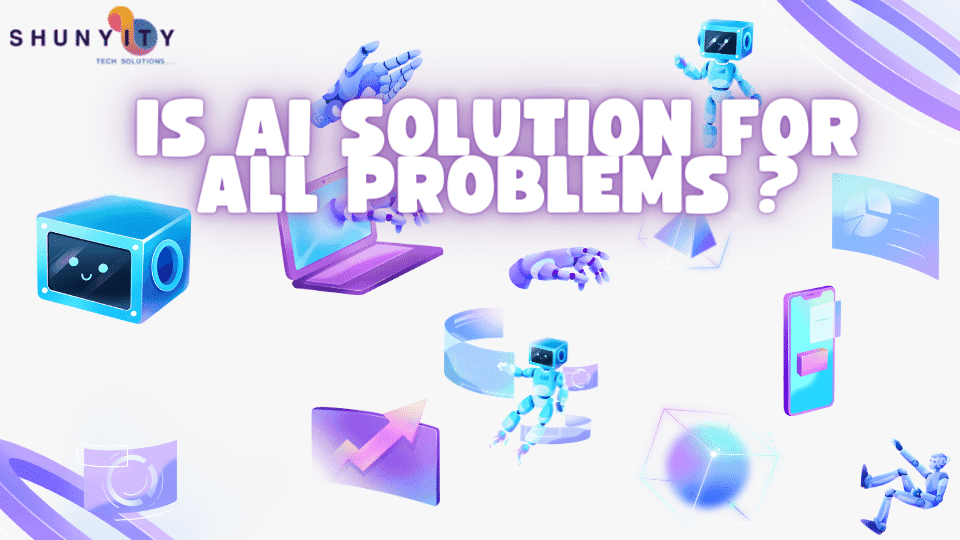
By Himanshu Sharma • 3/30/2024
Look, artificial intelligence (AI) is everywhere these days. From news headlines to tech conferences, it seems like AI is the magic ingredient for everything. But hold on a sec – AI isn't a silver bullet, and there are situations where it just doesn't make sense. As someone who's been working in the tech industry for a while now, let me share some scenarios where AI might not be the answer:
Imagine a therapist's office. A patient walks in needing someone to listen, understand their complex emotions, and offer guidance. While AI chatbots are making strides in communication, they can't replicate the human touch, empathy, and real-world experience a therapist brings. The same goes for roles like social workers, teachers, or even customer service representatives dealing with sensitive situations. In these cases, human connection and understanding are irreplaceable.
Let's say I'm working on an SPA for a footwear store. The homepage might showcase a beautiful banner, but clicking on a category like shoes wouldn't lead to a separate page. Instead, the shoes selection would magically appear on the same page. Cool for users, confusing for search engines. The search engine crawler might have no idea there's a dedicated section for shoes, making it hard to index that content properly.
With traditional websites, things are pretty straightforward. You can create dedicated pages for specific keywords, allowing you to optimize titles, descriptions, and content for each page. This makes it easy for search engines to understand what each page is about. But SPAs? They have one page for (almost) everything. Targeting a wider range of keywords effectively becomes a challenge.
Let's say a customer contacts a bank after experiencing identity theft. An AI system might be able to walk them through the process of freezing accounts and filing a report. However, it can't offer the emotional reassurance and personalized support a human representative can provide during such a stressful situation.
AI can certainly analyze vast amounts of data and identify patterns. But when it comes to true creativity, conceptual thinking, and generating original ideas – that's still very much a human domain. Writing a captivating novel, composing a soul-stirring symphony, or designing a groundbreaking invention – these all require a spark of creativity that AI currently struggles to replicate.
Imagine a team of artists designing a new line of clothing. While AI could analyze fashion trends and customer preferences, it can't capture the unique aesthetic and artistic vision that a human designer brings to the table.
AI thrives on data – the more it has, the better it performs. But what if the data you have is limited, biased, or simply inaccurate? Feeding an AI system with bad data can lead to unreliable and potentially harmful results. In situations where data quality is a concern, relying on human expertise might be the safer option.
Imagine a company developing a new medical diagnostic tool powered by AI. If the training data for the AI is skewed towards a specific demographic, it might lead to inaccurate diagnoses for other groups. In such cases, relying on the experience and judgment of human doctors is crucial.
AI algorithms are only as good as the data they're trained on. Unfortunately, data sets can be biased, leading to discriminatory outcomes when applied in real-world scenarios. For example, an AI system used for recruitment might inadvertently favor certain demographics based on historical hiring patterns within the data. Implementing and using AI ethically requires careful consideration and mitigation strategies for potential biases.
Imagine a loan approval system powered by AI. If the training data for the AI reflects historical lending practices that discriminated against certain groups, the AI system might continue this bias, unfairly denying loans to qualified applicants.
Developing and implementing sophisticated AI solutions can be expensive. This includes the cost of acquiring vast amounts of data, training powerful computing systems, and hiring skilled AI specialists. For smaller businesses or organizations with limited resources, the cost of AI adoption might outweigh the potential benefits.
While a large corporation might benefit from an AI system for automating certain tasks, the cost of implementation and maintenance might be problematic for the smaller firm. In this case, traditional accounting software might be a more cost-effective solution.
Remember, the future of work will likely involve a collaborative approach, where AI complements and enhances human capabilities. So, keep an eye on AI advancements, but don't feel like you've missed the bus if it's not the right fit for your situation right now. There's still plenty of room for human ingenuity and expertise to thrive in the AI era.
| Latest Blogs |

Shunyity Tech Solutions is a leading provider of innovative IT solutions. We provide a wide range of services to help you achieve your goals.
Follow us
Our Services
Digital MarketingArtificial IntelligenceMachine LearningWebsite DevelopmentCybersecurityCloud SolutionsData AnalyticsEnterprise SolutionsMobile App DevelopmentSoftware DevelopmentIT ConsultancyLearning and IT TrainingContact Us